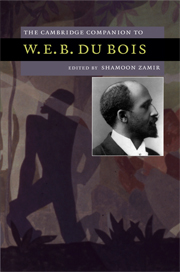Book contents
- Frontmatter
- Introduction
- 1 The Souls of Black Folk: Thought and Afterthought
- 2 “Of the Coming of John”
- 3 The Fiction of W. E. B. Du Bois
- 4 Du Bois and the “New Negro”
- 5 Du Bois, Black Leadership, and Civil Rights
- 6 Du Bois, Race, and Diversity
- 7 Du Bois on Race: Economic and Cultural Perspectives
- 8 Africa and Pan-Africanism in the Thought of Du Bois
- 9 The Place of W. E. B. Du Bois in American and European Intellectual History
- 10 Race, Marxism, and Colonial Experience: Du Bois and Fanon
- Further Reading
- Index
Introduction
Published online by Cambridge University Press: 28 November 2008
- Frontmatter
- Introduction
- 1 The Souls of Black Folk: Thought and Afterthought
- 2 “Of the Coming of John”
- 3 The Fiction of W. E. B. Du Bois
- 4 Du Bois and the “New Negro”
- 5 Du Bois, Black Leadership, and Civil Rights
- 6 Du Bois, Race, and Diversity
- 7 Du Bois on Race: Economic and Cultural Perspectives
- 8 Africa and Pan-Africanism in the Thought of Du Bois
- 9 The Place of W. E. B. Du Bois in American and European Intellectual History
- 10 Race, Marxism, and Colonial Experience: Du Bois and Fanon
- Further Reading
- Index
Summary
W. E. B. Du Bois has occupied a pre-eminent place in African American literary, social, and political thought for a very long time, and, in recent years, he has been recognized as a figure central to the history of American thought in the twentieth century. His critique of the educational and political policies of Booker T. Washington set the agenda for debates about populism, leadership, and the relative merits of a humanistic education within the black community for much of the century. His role in the founding of the National Association for the Advancement of Colored People (NAACP) placed him at the forefront of the African American civil rights movement. As a key interpreter and disseminator of Pan-Africanism, he became a central figure in postcolonial discourse. As the author of a number of landmark works in black historiography and sociology, he brought a scholarly rigor to an understanding of the social and historical dimensions of race in the United States which is impressive even today. As a mentor to and supporter of many of the writers of the Harlem Renaissance, he helped shape the literary movement which continues to attract the greatest attention within African American literary studies. Perhaps most importantly of all, in The Souls of Black Folk (1903) he produced a work of exceptional literary achievement, among the most widely read and most often quoted works in African American literary history. It is the work by which most readers know Du Bois; it is also the work in which he most thoroughly explores the implications of his famous proposal, made at the first Pan-African conference in London in 1900 and then repeated throughout his career, that “the problem of the Twentieth Century is the problem of the color-line.” No other writer has made us understand as clearly and fully as Du Bois that race and modernity are indissolubly linked: to think one is necessarily to think the other.
- Type
- Chapter
- Information
- The Cambridge Companion to W. E. B. Du Bois , pp. 1 - 6Publisher: Cambridge University PressPrint publication year: 2008
- 1
- Cited by

